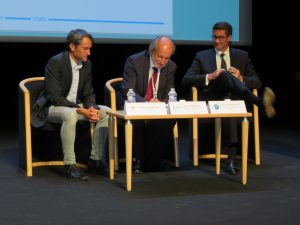What are you looking for ?
Content on this site
A person on the directory
Catalog training
Content on this site
A person on the directory
Catalog training

IC2MP – Mirror Laboratory
The aim is to take advantage of the scientific complementarity between IC2MP and E2P2L. In this context, IC2MP is studying the development of catalytic processes for the conversion of polyols (sugars) from biomass.
For its part, E2P2L will bring its expertise in two areas (1) modelling that makes it possible to streamline certain reactive mechanisms or even sometimes to predict certain reactivities and (2) the technological feasibility of developed reactions.
The synergy between these two laboratories should allow the development of more environmentally friendly chemical processes. For example, cosmetic solvents or biodegradable polymers
On the human level, exchanges are planned between the two laboratories. It is important to emphasize that there are already strong interactions between these two laboratories not only through the co-supervision of doctoral students but also in the context of short missions of researchers going to Shanghai and vice versa. This collaboration is also beneficial for identifying and recruiting young talent.
E2P2L – Eco-Efficient Products and Processes Laboratory
In 2011, the CNRS and SOLVAY created an international joint unit «Eco-Efficient Products and Processes Laboratory (E2P2L)» located at the SOLVAY research centre in Shanghai.
She specializes in topics related to chemistry for sustainable development. The projects aim to develop new synthesis methods and more environmentally friendly processes from biomass and/or CO2, with applications in the field of surfactants or bio-based polymers. This laboratory is based on basic research and modelling approaches while retaining industrial application as the purpose of its research.
The signing of the agreement establishing the mirror site between the Eco-efficient products & processes laboratory in Shanghai and the Institut de chimie des milieux et matériaux in Poitiers, in the presence of Antoine Petit, President and CEO of the CNRS, was formalized on 13 May 2019 at the opening of the International Congress symposium for green chemistry ISGC, at La Rochelle
The INCREASE Research Federation is a public-private collaborative network dedicated to eco-design and renewable resources.
Eight research laboratories are part of Increase:

La FRH2 : the French Research Network on Hydrogen Energy
Created in January 2020, it brings together 28 research laboratories including the IC2MP.
Or-nano means “nano-gold”. The GDR Or-nano is an active network of French scientists working on gold nanoparticles. It is supported by the CNRS as Research Group, since January 2017. The IC2MP is a member of this network that brings together 74 different teams in France.
The IRP* GLYCOMIMIC is a joint research program between IC2MP (UMR CNRS 7285 / Univ. Poitiers), the University of Barcelona (Spain, Pr. C. Rovira) and the Center for Cooperative Research in Biosciences (CICbioGUNE, CIC, Spain, Pr. J. Jiménez Barbero). Its main objective is to assist the design of specific CAZymes inhibitors for therapeutic and biotechnological purposes in need of action by developing an innovative superacid-based approach to gain insights into Carbohydrate Active enZymes transition states.
Responsible: Sébastien THIBAUDEAU
Beginning: 01/01/2022
Duration: 5 ans
*International Research Projects are collaborative research schemes between one or more CNRS laboratories and one or two laboratories from foreign countries. They strengthen previously-established collaboration through short- and medium-term scientific exchange. They are aimed at organising working meetings or seminars, developing joint research activity including field research, and supervising students. The French and foreign teams concerned must have already shown their capacity to collaborate (for example through one or more joint publications). These programmes have a duration of five years. More information
The IRP* (International Research Program), joint research program between IC2MP (Université de Poitiers/CNRS) and INCAPE (CONICET and Universidad Nacional del Litoral, Santa Fe, Argentina) is based on the conversion of natural gas into products of interest for chemicals. Its main objective is to develop heterogeneous catalysts for the transformation of propane into propene. Other aspects such as the conversion of biogas or the aromatization reactions of light alkanes are also envisaged.
Responsible: Florence EPRON
Beginning: 01/01/2021
Duration: 5 ans
*International Research Projects are collaborative research schemes between one or more CNRS laboratories and one or two laboratories from foreign countries. They strengthen previously-established collaboration through short- and medium-term scientific exchange. They are aimed at organising working meetings or seminars, developing joint research activity including field research, and supervising students. The French and foreign teams concerned must have already shown their capacity to collaborate (for example through one or more joint publications). These programmes have a duration of five years. More information
Oncosphère Nouvelle Aquitaine, site de Poitiers Sébastien PAPOT, member of the steering committee
Energie P. CEZAC – University of Pau, T. NAPPORN et N. BION, (CNRS/IC2MP)
Silvana A. SERGENT- INRAE, F. JEROME (CNRS/IC2MP)
Eau A. DUPUY– INP – Bordeaux, J. LABANOWSKI (CNRS/IC2MP)
AclimaT B. SAUTOUR– EPOC – Bordeaux, C. COUTANCEAU (Université de Poitiers/IC2MP)